Reported by Arthika
Addressing a meet-the-public gathering in a school nursery in East Ham, London on 17 August 2013, Sampanthan, seated under a blue wall that featured Nemo and a couple of smiling sharks, implored the Diaspora to ask their relatives back home to vote for the TNA and pave the way for its victory. In keeping with the cheery kindergarten theme of the venue, Sampanthan provided comic relief and displayed a lackadaisical attitude as he fielded questions from an emotional and angry audience.
In the course of his talk and the subsequent Q&A session, Sampanthan was quick to reiterate several times that the Tamils are a distinct people, just as the Sinhalese are a distinct people. Yet, when asked about the national question by a very elderly gentleman–who would ever so often unwrap a red shawl, point at the map of Tamil Eelam emblazoned on it and speak of Thanthai Chelva’s dream, the Vaddukkoddai resolution and independence–Sampanthan started quoting a 1998 judgment of the Supreme Court of Canada on the secession of Quebec. Drawing upon this judgment, he said that in international law, the right to secession under the principle of self-determination arises only under three conditions: a) when the people are under a colonial empire; b) where the people are subjugated by a foreign or alien oppression and c) when the people are completely denied the right to internal self-determination. By citing this case, he attempted to rule out secession of Tamil Eelam under the Right to Self Determination by claiming that these three criteria did not apply in the current context in Sri Lanka and that it was premature to say that the right of internal self-determination had been completely nullified in the island. While the Tamil Diaspora is eager to continue the fight for the Right to Self Determination of the Tamil-speaking people, it became evident that the Tamil leadership like the TNA is trying to get away from this struggle and abandon the demand. Clearly, Sampanthan’s position was in conflict with the demand of the people in the Diaspora. Moreover, citing the example of Quebec exposed the fact that Sampanthan was using historical examples opportunistically to defend the TNA position in Sri Lanka. It is evident dishonesty to talk to the people of reflecting their aspirations, and on the other hand actively campaigning on behalf of the Government of Sri Lanka. He was channeling the demand (of “internal self-determination) that has been formulated by India and other players like the ICG.
Sidestepping another question as to how other nations managed to secede or conduct independence referendums, Sampanthan drew upon the role of the Indian army in the liberation struggle of Bangladesh but commented that on the other hand, the Eelam Tamils had asked the Indian army to go back. This was another instance where he had got his history wrong. Atrocities committed by the Indian Army in Bangladesh have been well documented. The Indian Army did not play the progressive role of a liberator in either conflict. By blaming the Tamil people for sending the IPKF back—an occupying army whose rapes and extrajudicial killings in Eelam is legion—Sampanthan falls into the trap of victim blaming and faults the Eelam Tamils for the enormous losses that they have suffered. Moreover, such talk from a senior Member of Parliament builds up further illusions about India and is aimed at confusing the Diaspora and the Tamil people in Sri Lanka.
When questioned about the reason as to why he was waving the ”lion flag” of Sri Lanka during a May Day rally last year alongside Ranil Wicremasinghe, Sampanthan made light of the rebuke and explained it away by claiming that the lion flag was not just the Sri Lankan national flag but he had carried it because it was originally the flag of a Tamil amman temple. One is aware that there are lots of lions on temple flags and inside forests, but such a reply betrayed opportunism.
Further, the TNA leader also sought to cast himself as the sole representative of the Tamils, adding that America, Western powers, and even India had recommended the Sri Lanka government to engage in talks with the TNA to address the issues of the Tamil people. Likewise, listing out the achievements of the TNA he claimed that their lobbying was responsible for the change in the position of the Indian Government on Sri Lanka. While India changing its position on Sri Lanka is indeed ‘news,’ one must also observe the manner in which the role of the students’ movements in Tamil Nadu was skillfully obliterated.
In a previous TNA meeting held in Harrow on 15 August, the audience were asked not to raise any questions about the Northern Provincial Elections and the merits or demerits of TNA’s participation. Keeping the Diaspora stand in mind, Sampanthan dodged questions on the 13th Amendment by maintaining that the ground reality was different.
Previously in a meeting at East Ham, Sumanthiran, a leading member of the TNA had said that conducting CHOGM (Commonwealth Heads of Government Meet) in Sri Lanka would be a good development because the International Community could use the opportunity to put pressure on Sri Lanka. He also observed that the unanimous resolution in the Tamil Nadu assembly demanding a referendum in Eelam to solve the national question was counter-productive since other Indian states were not ready yet.
Even as the situation on the ground is rife with news of rapes and land grab and military occupation, the TNA MPs maintained an uneasy silence about the atrocities faced by the Tamil people and they have instead indulged in condemnable and opportunistic politics.

